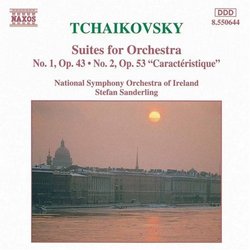| All Artists: Pyotr Il'yich Tchaikovsky, Stefan Sanderling, National Symphony Orchestra of Ireland Title: Tchaikovsky: Suites for Orchestra Nos. 1 & 2 Members Wishing: 0 Total Copies: 0 Label: Naxos Original Release Date: 1/1/1993 Re-Release Date: 6/28/1994 Genre: Classical Styles: Historical Periods, Early Music Number of Discs: 1 SwapaCD Credits: 1 UPCs: 730099564427, 4891030506442 |
Search - Pyotr Il'yich Tchaikovsky, Stefan Sanderling, National Symphony Orchestra of Ireland :: Tchaikovsky: Suites for Orchestra Nos. 1 & 2
 | Pyotr Il'yich Tchaikovsky, Stefan Sanderling, National Symphony Orchestra of Ireland Tchaikovsky: Suites for Orchestra Nos. 1 & 2 Genre: Classical
|
Larger Image |
CD DetailsSimilar CDs |
CD ReviewsA Great Recording of Two Little Known Works Timothy Kearney | Hull, MA United States | 08/18/2004 (4 out of 5 stars) "In high school, I had to do a research paper. I had the opportunity to select the topic. Since I loved classical music and our school did not have a music appreciation course, I decided that I would write a paper on my then favorite composer, Peter Il'yich Tchaikovsky. I recall being surprised that he was a composer who thrived best under structure. There is probably good reason for this; whenever he tried to be creative, critics panned his work and he became a bit shell shocked. This reaction is typical for people who are ahead of their time, and while today Tchaikovsky would be considered a mainstream, traditional composer, in his day hew as revolutionary. Perhaps this is what makes the Orchestral Suites most enjoyable. The composer had the freedom to experiment with various musical styles without being held to standard musical conventions. In this Naxos collection we hear the first two orchestral suites. The works are generally unknown to most listeners, though the "Marche Miniature" of the first suite will probably sound familiar to many listeners. In both suites we hear glimpses of works yet to come, namely the later symphonies, SLEEPING BEAUTY and THE NUTCRACKER. The suites make excellent background music and can likewise be luxurious works that can capture a listener's attention. Beautiful music by a composer like Tchaikovsky is a given, but many times the recordings available hardly reflect the majesty of the music. I have more than one version of the 1812 Overture that makes me wonder if Napoleon actually won the battle and Tchaikovsky was mourning for Russia and recordings of Symphony #6 that "pathetic" would be a more appropriate title of the recording that "Pathetique." Listners will discover that this is not a chancy Tchaikovsky recording. Once again Naxos provides us with a budget recording that is worth full price. Stefan Sanderling and the National Symphony Orchestra of Ireland play this music in a manner that gives it the glory it deserves. " Great recording of little-known Tchaikovsky works I. J. J. Nieuwland | Amsterdam | 11/16/1999 (5 out of 5 stars) "Tchaikovsky's suites for orchestra have received much too little attention, but this recording gives the pieces a long-deserved vindication; idiomatic, sensitive but not overly sentimental and at times very intense, Sanderling and his orchestra offer true value for the little money you'll spend on this CD." Enjoyable Tchaikovsky rarities Robert E. Nylund | Ft. Wayne, Indiana United States | 04/18/2006 (5 out of 5 stars) "During the years between the composition of his fourth and fifth symphonies, roughly 1877 to 1888, Peter Tchaikovsky (1840-1893) wrote a number of works that have largely been neglected or seldom performed or recorded. Among these were the extended symphonic poem "Manfred" and the four orchestral suites.
This writer discovered the third orchestral suite through a pioneering Decca/London stereo recording that was made in the 1950s by Sir Adrian Boult. I particularly enjoyed the extended theme and variations that Tchaikovsky used to conclude the suite. It was my first introduction to some of the innovative music that Tchaikovsky wrote during years when he often questioned his musical abilities as he continued to struggle with recurring "melancholy" and the general depression that followed his disastrous marriage. In many ways, Tchaikovsky was never the same after 1877, when his romantic idealism was shattered by the perceived realities that he could not have a truly intimate relationship with a woman. The only woman who remained his friend, almost to the end of his life, was his wealthy patroness, Madame von Meck, whom he never formally met (by mutual agreement). Then I heard a mid-1950s Columbia recording (only released in monaural sound) by Dmitri Mitropoulos and the New York Philharmonic of the first orchestral suite. This was an astonishing recording of music that begins with deep, brooding, haunting, rather sad tunes that seem to echo the very questions that tormented Tchaikovsky. Mitropoulos, who had his own personal struggles despite exceptional musical talent, clearly identified with this music. Now we have a newer recording of both the first and second suites by Stefan Sanderling (son of the legendary Kurt Sanderling) and a very fine Irish orchestra on Naxos, a company which has been so thorough in recording both familiar and unfamiliar classical works. The performances are outstanding and have excellent, full stereo sound. There is a richness in this music, which has so much variety and imagination. Sometimes Tchaikovsky explored earlier musical forms, especially because of his fondness for the music of Mozart, and this musical exploration is quite apparent in these orchestral suites. The suite is actually an older musical form than the symphony. The symphony grew out of the Baroque sinfonias and overtures; it was first developed by composers such as Johann Christian Bach and Franz Joseph Haydn. Traditionally, suites were collections of dances and much of the music Tchaikovsky composed is suitable for dancing. Nevertheless, it is all very enjoyable and enchanting. Maestro Edvard Tchivzhel, who has led the Fort Wayne Philharmonic since the mid-1990s, observed that the slow movement in the first suite is particularly powerful and moving. He noted that when Tchaikovsky played the music on the piano for a small audience one of the female listeners wept at the very emotional music. There is clearly deep feeling throughout the suites, ranging from the melancholy to the jubilant. This music clearly reflects the constantly shifting changes in Tchaikovsky's own personality. We know more now about Tchaikovsky than many of his listeners knew at the time this music was first performed; his personal struggles, which are often explained in his extensive letters (especially to Madame von Meck), are better understood. Tchaikovsky's difficult life resulted in music that still lives today and it continues to amaze and delight us. Yes, some of the tunes anticipate his ballets "The Sleeping Beauty" and "The Nutcracker." Yet the music here is highly original, even when it reflects earlier musical styles and forms. The performances are top-notch throughout and, thanks to the budget pricing of Naxos discs, is all the more affordable and available to the classical music collector. " |

 Track Listings (11) - Disc #1
Track Listings (11) - Disc #1